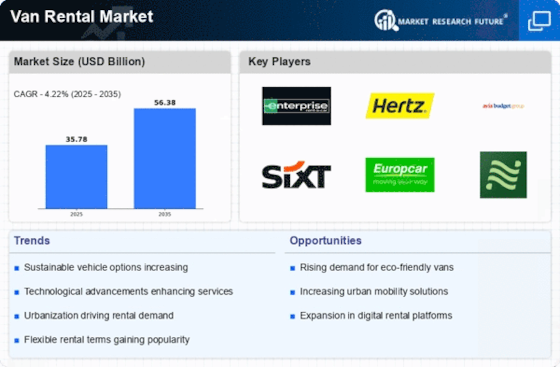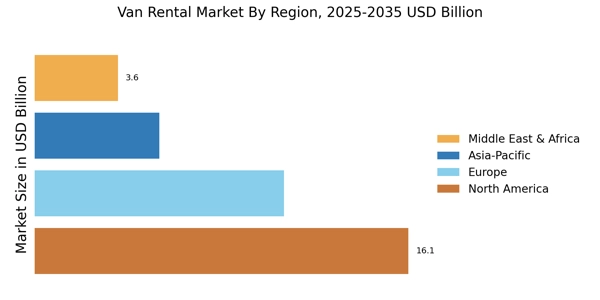Rising E-commerce Activities
The surge in e-commerce activities has notably influenced the Van Rental Market. As online shopping continues to expand, businesses require efficient logistics solutions to meet customer demands. This has led to an increased need for rental vans to facilitate last-mile deliveries. In fact, the demand for vans in logistics is projected to grow by approximately 8% annually, reflecting the industry's adaptation to changing consumer behaviors. Companies are increasingly opting for rental services to manage fluctuating delivery needs without the burden of ownership costs. This trend indicates a shift towards more flexible transportation solutions, positioning the Van Rental Market as a critical player in the evolving logistics landscape.
Tourism and Leisure Activities
The tourism sector plays a pivotal role in the Van Rental Market, as travelers often require spacious and comfortable vehicles for group excursions. With the rise in leisure travel, particularly in scenic destinations, the demand for rental vans is likely to increase. Tour operators and travel agencies are increasingly incorporating van rentals into their packages to enhance customer experiences. Data suggests that the leisure travel segment could contribute to a 7% growth in the van rental sector, as families and groups prefer the convenience of renting vans for road trips and sightseeing adventures. This trend underscores the significance of the Van Rental Market in supporting the tourism economy.
Urbanization and Mobility Trends
Urbanization is a driving force behind the growth of the Van Rental Market. As more individuals migrate to urban areas, the demand for transportation solutions that cater to both personal and commercial needs increases. The rise in population density in cities often leads to congestion, prompting consumers to seek alternative mobility options. Rental vans provide a practical solution for moving goods or groups without the hassle of ownership. Furthermore, urban mobility trends suggest that the van rental sector could see a compound annual growth rate of around 6%, as urban dwellers prioritize convenience and flexibility in their transportation choices.
Corporate Travel and Event Management
The resurgence of corporate travel and event management has positively impacted the Van Rental Market. Businesses are increasingly organizing off-site meetings, conferences, and team-building events, necessitating reliable transportation for employees and equipment. The corporate sector's reliance on rental vans for group travel is expected to grow, with estimates indicating a potential increase in demand by 10% over the next few years. This trend highlights the importance of the Van Rental Market in facilitating corporate mobility and logistics, as companies seek to optimize their travel budgets while ensuring employee comfort and efficiency.
Technological Advancements in Fleet Management
Technological advancements are transforming the Van Rental Market, particularly in fleet management. The integration of telematics and real-time tracking systems allows rental companies to optimize their operations and enhance customer service. These technologies enable better vehicle utilization, maintenance scheduling, and route planning, which can lead to cost savings and improved efficiency. As more rental companies adopt these innovations, the industry is likely to experience a growth rate of approximately 5% annually. This shift towards technology-driven solutions not only benefits rental companies but also enhances the overall customer experience, making the Van Rental Market more competitive and responsive to market demands.

















